2019-3-22 00:29 |
The idea of Brave Browser came to fruition mostly thanks to the efforts of one man many thought was finished in the business world, former Mozilla co-founder and CEO Brendan Eich.
Merely 11 days after he was advanced to the position of the CEO of Mozilla Corp., Mr. Eich had his dreams and efforts smashed by a bunch of internet busybodies who had an issue with him donating money to a failed Californian ballot initiative that wanted to define marriage as an affair reserved for heterosexual couples.
His story was somewhat of an outlier back in the days but nowadays we see cases like his on a regular basis: once the Twitter police gets their hands on something controversial you did or even said years ago (even though that something is perfectly normal, legal, and doesn’t affect the quality of the work you put out), an avalanche of trolls and virtue signaling cause fighter-I mean journalists will swoop in with damning articles and catchy hashtags and remove you from your job.
Basic Attention Token – BAT Price Forecast 2019
This is more or less what happened to Eich back in 2014. Mozilla felt the social justice warrior pressure and decided it’s easier to succumb to the will of a loud minority than to stand up for a loyal employee (let alone its founder). As such, a “mutual” agreement was reached with Eich to have him resign from his position at the corporation.
The company cited their dedication to “diversity, equality, and being different” as the reason why they did this, which is quite ironic considering they fired the man just because he dared to think differently.
For his part, Eich refused to bend the knee regarding his principles, which probably irked the outrage mob the most and led to him losing his job at a company he brought from the ground up.
But I digress; whether you thought his firing was justified or not, we can all agree that it ultimately led to the creation of one of the most popular cryptocurrency-related projects of today, the mentioned Brave Browser.
As is the case with good cryptocurrency start-ups, there’s no room for identity politics; if you’re offering a quality blockchain-based service, people will take notice. And take notice they did, as Brave managed to collect $36 million during its 2016 ICO (having secured $2.5 million in angel investment prior to that).
It’s been almost three years since that and Brave seems to be on the up-and-up. But is this enough for the project to achieve its ultimate goal, which is to supplant one of the current browser heavyweights by providing ad-and-tracker-free browsing experience?
As you could probably tell from the somewhat extensive intro, today we’ll be comparing Brave’s ability to do so against its founder’s former product, Mozilla Firefox.
Brave vs MozillaFirst thing to note about Brave is that it’s based on Chromium, an open source browser project that also forms the basis for the currently most popular browser on the market, Chrome.
Background EngineAs such, from the “engine” side of things Brave is pretty much a re-skin of Chrome, offering quite similar levels of performance to what Google’s browser has to offer. Some might argue that this contributes to Google’s stranglehold on the Internet, and they would be kinda correct.
Still, Chromium is rather polished performance-wise and Mozilla has been known as a slow, resource-hogging browser ever since its creation. Does that translate into their performance?
Opening Mozilla on the “new tab” page taxed our test CPU only 8-10%, whereas with Brave, the CPU suffered the loads of around 3-4%. RAM is probably the main area you want to look at; Brave seems to grab around 900 MB of this precious resource once launched, while Mozilla shows that they’ve improved massively since their early days with only 300 MB of RAM being used once you open it.
Additionally, we ran both through this free online browser speed test which measures online the speed of JavaScript in your browser; Mozilla returned a performance level of 1566 while Brave recorded significantly lower 921.
The result of our small test clearly shows what was obvious from the start: Brave does seem to have slightly worse performance. We say that this was obvious as Brave is still in early development and hasn’t even seen its 1.0 release yet.
Best crypto trading bots on the market.
Additionally, Brave comes pre-loaded with various features and “add-ons” while our test Mozilla had nothing on it, which definitely led to Brave hogging up more RAM. Overall these performance levels won’t matter much to users today, as most people have dual core and stronger CPU’s, as well as more than enough RAM to handle either of the browsers.
Therefore, the battle will be fought and won on other fronts, fronts like the privacy, security, and ad-blocking ability that are on offer to the average user.
SecurityBrave comes out strong here, most notably having pre-installed phishing, malware, script blockers and features like HTTPS Everywhere (which automatically upgrades each website you visit to the HTTPS standard). Brave also has a pre-installed AdBlock shield that gives you the ability to choose whether you want to see all ads, see only Brave ads, or see no ads at all.
Finally, Brave offers simple cookie control and fingerprinting protection features that let you control who gets access to your data.
Brave is also packed with extensions such as 1Password, bitwarden and Dashlane password managers, Honey (automatically finds and applies coupon codes when you shop online), PDF Viewer, Save to Pocket (bookmarking extension), and Torrent Viewer.
PrivacyWith all those features, Brave also adds that your browsing data is stored locally, without the company ever gaining access to it. This means that your data will never be sold to advertisers or exploited for nefarious purposes as a result of Brave’s actions.
Meanwhile, our barebones Mozilla offers tracking content blocking, cookie control, pop-up blocking, as well as deceptive content and dangerous software protection. This isn’t much, but users do have a massive Mozilla plug-in and extension library from which they can enhance their browsing experience with quality software like ublock Origin, HTTPS Everywhere, Privacy Badger, Decentraleyes, Cookie Autodelete and others.
One important thing to note is that the browser comes with data tracking enabled automatically; this means that Firefox has been set to collect your browsing data automatically.
They do say that permission is always asked before receiving this data but having the feature enabled as soon as you download the browser speaks volumes about their dedication to preserving the privacy of your data. Still, Mozilla can be run through the Tor privacy network which is a positive.
SyncingSome additional features that would interest our users include the sync ability and cryptocurrency focus of these browsers. Regarding data synching, Mozilla had this feature enabled for years now; it allows you to sync your passwords, extensions, form data to any desktop, Android or iOS device.
The synchronized data is encrypted, meaning that no one can access it from the outside. Brave’s synching capabilities are much more humble, as you can only perform it on your desktop browsers. Brave Sync is encrypted from the client side, meaning that the company doesn’t get access to this data as well. The project plans on introducing sync capabilities to your Brave Payments, as well as expending the feature to Android and iOS devices in the future.
Cryptocurrency FriendlinessFinally we come to the cryptocurrency side of the matters.
Brave is clearly the “crypto-focused” one here, offering a native wallet for the project’s cryptocurrency BAT. The wallet can be loaded up with BAT that can be used for tipping content creators that apply for the Brave Publishers program. There is also a BAT incentive paid out to users who watch Brave Ads.
As for Mozilla, they had a somewhat adverse stance on crypto in the past, namely going after crypto mining scripts that websites started installing. This isn’t necessarily a bad thing but it does prevent people from “helping out” their favorite websites who decide to implement the crypto mining scripts.
MetaMask, popular Ethereum/ERC 20 token wallet client can be installed on both browsers, expanding their crypto usability significantly.
In ConclusionSo after we fired all the guns, which one of these two browsers comes out as our winner? It’s hard to say. Mozilla has a pedigree in the internet community, having slowly risen in popularity ever since its launch.
The company’s practices can be questionable at times but their product seems to be getting better with each update. Brave on the other hand is a pretender in the space, something Mozilla once was when Brendan Eich was in charge there.
Considering he had a significant role in getting his former company to where it is now, it’s safe to say that Brave has a good idea on what they need to do to grab a bigger market share.
The market’s biggest players, Chrome and IE, became popular mostly because they were packaged with/heavily shilled through Google/Microsoft products.
This implies that most people don’t care what type of browser they use, as long as it’s convenient for them to use it. Ultimately it should come down to the small percentage of crypto-oriented folk who might be more inclined towards Brave due to a feeling of supporting a common cause.
Others might find the features Brave has better than what the competition has on offer. It remains to be seen what the future holds, but with 7 million downloads and counting, Brave seems to be on the right path to challenge the current browser market order.
The post Brave Browser vs Mozilla Firefox: Is Brave Already Better Than Firefox? appeared first on CaptainAltcoin.
origin »Ceocoin (CEO) на Currencies.ru
|
|








